If you’re experiencing ISP throttling, using a VPN is the best method to prevent it and enjoy fast connection speeds. Here’s how a VPN can help you stop internet throttling:
- Subscribe to the fastest VPN provider like NordVPN.
- Create a user account.
- Sign into your account and connect to a server nearby.
- Wait until the connection is established, then browse the web at blazing-fast speeds.
ISP throttling is a widespread activity in which ISPs deliberately slow down internet speed to limit users from engaging in high-bandwidth activities like streaming, gaming, and torrenting. It has always been a prime concern of privacy advocates. However, the repeal of net neutrality has worsened the situation as it empowers internet providers to sneak into users’ activities and throttle their connections without informing them.
While internet throttling is an unfair practice provoking incredible frustration among users, there is a way to get around it. A reliable VPN is an effective tool to avoid bandwidth throttling and ensuring fast connection speeds over the web. There are other ways to stop throttling, so read along and learn everything.
Why do ISP throttle users’ internet bandwidth?
ISP throttling is a planned activity they do purposefully, but they throttle specific users. Since they monitor whatever you do on the web, they decide whether to slow down your internet connection based on your activities.
Here are the common reasons why ISPs throttle the internet connection:
- Blocking Illegal Activities: When the ISP recognizes any internet traffic as illegal, like downloading or sharing copyrighted content or any activity violating their service terms, they use throttling to control internet traffic over their network.
- Enforce Data Caps: ISPs also limit the monthly high-speed data you can use. When your monthly data limit is near or if you notice slow connection speed toward the end of the month, it means you are over your data caps.
- Paid Prioritization: The ISPs use bandwidth throttling while you use specific websites or services like Netflix or Prime Video. They do so to push the customers to use services affiliated with the ISP or force the company to pay more for faster speeds.
- Net Neutrality: With the repeal of net neutrality, ISPs are no longer required to treat all internet traffic equally and monitor users’ online activities. If they notice anything against their policy, you may experience data throttling.
- Network Congestion: To decongest the network during peak hours when the network becomes overcrowded with people, ISPs throttle internet connection which results in slowing your internet speeds.
- Excessive Bandwidth Usage: Your ISP might throttle the connection speed when he sees you engaging in activities that take up much bandwidth, like excessive streaming, gaming, and downloading large files or torrents. To optimize the network traffic, the service provider restricts your bandwidth even if you’ve paid for a high bandwidth plan.
Other reasons for slow internet could be non-payment of bills. Regardless of the reason, bandwidth throttling is an unfair practice, and users need to take action to eliminate it.
How to stop bandwidth throttling – Four easy methods
ISP throttling is like the worst nightmare, but the good news is that you can take action to prevent it. There are some reliable ways to stop bandwidth throttling. Below are the four easiest methods you can choose from:
- Use a VPN: You can always use a VPN to bypass internet throttling. A VPN encrypts your internet traffic hides your online activity from your ISP and lets you surf the web with fast connection speed while enjoying a greater anonymity level.
- Switch to a new service provider: If you notice that your ISP is throttling your internet speed, change your ISP. Nearly all ISPs are involved in throttling so that it won’t save you ultimately, but you can somehow control things. Read the terms of service carefully and choose an ISP with less strict policies.
- Increase your data plan: If you’re tired of experiencing slow and sluggish connection while streaming and torrenting, then upgrading your internet plan can be a good option. Contact your ISP and inquire about a high bandwidth plan for specific activities. Remember, this will cost you more, so choose this option only if you have a budget.
- Use a proxy: A proxy acts as a middleman between the device and the internet that replaces your IP address with the IP address of the proxy server. This way, you can spoof your location and enjoy increased speed without the ISP knowing anything. However, since a proxy doesn’t encrypt the data traffic, you can only stop your ISP from throttling your internet speed for a short time.
All the above-described methods come with some cons. However, using a VPN doesn’t have such significant drawbacks, and it is the best way to avoid throttling. In addition, a VPN lets you enjoy free and open internet without worrying about speed and geographical restrictions.
How does internet throttling work?
If your internet speed drops suddenly, it’s possible that your internet connection is being throttled. But there are many other causes for slow internet, and hence sometimes it becomes difficult to determine if ISP is throttling the connection. You can test your internet speed to confirm if your ISP is throttling your connection.
- Data plan – ISPs segregate customers into different lanes, distinguishing between fast and slow lanes based on subscription levels. The highest-paying subscribers are granted access to the fast lanes, while lower-tier contracts are allocated to the slow lanes. To further complicate matters, ISPs can offer ‘Paid Prioritization’ to third-party companies, enabling streaming services like Netflix to establish exclusive fast lanes directly to their servers.
Consequently, if you don’t qualify for your ISP’s fast lane, your internet connection may suffer from throttling when attempting to access Netflix or other similar services. Similarly, while connecting to the specific streaming service affiliated with your ISP could yield faster speeds, accessing competing sites may result in intentional throttling.
- Amount of data you consume – In some cases, your ISP may enforce a soft data cap, which means that surpassing the allocated limit can lead to reduced speeds and potential instability in your connection. AT&T allows customers who exceed their data cap to continue with slower connection speeds or opt for a higher data allowance by paying additional charges. It’s important to note that this is distinct from a hard data cap, which prevents establishing an internet connection beyond the set limit.
- The IP addresses of the websites you visit – ISPs can monitor your browsing history, and certain companies can even intentionally throttle bandwidth-intensive activities such as streaming, online gaming, and P2P file sharing. They can identify and target traffic attempting to connect to popular streaming services and video game servers, subjecting it to throttling measures.
- The protocols you use on your internet connection – Your ISP can examine the content of your traffic using a technique known as deep packet inspection (DPI). When you access a server, your internet traffic is transmitted in small units called packets, which establish a connection between your device and the server.
Deep packet inspection enables your ISP to scrutinize the packets that compose your internet connection. By employing this method, some ISPs can identify protocols in your traffic that tend to consume significant bandwidth. Also, they use it to throttle users engaged in torrenting activities, as it helps identify identifiable P2P protocols used for file-sharing purposes.
- Accessing certain websites through an internet firewall – In nations with stringent online regulations like China and Iran, the ISPs are typically state-owned or affiliated, resulting in close internet access monitoring.
Authoritarian governments employ severe throttling as a primary censorship tactic, often targeting specific apps associated with recognized TCP/IP ports.
China’s renowned internet censorship system, The Great Firewall of China, effectively throttles and blocks access to designated websites and services. This firewall utilizes techniques, including deep packet inspection, to analyze unencrypted internet traffic and deliberately slow down connections attempting to access forbidden sites. Furthermore, these countries possess sophisticated online firewalls capable of detecting VPN encryption, allowing them to identify certain VPN services based on their connection protocols.
How to tell if your internet is being throttled
If your internet speed drops suddenly, it’s mainly because of throttling. But many other factors contribute to slow internet speeds, and hence sometimes it becomes difficult to determine if ISP is throttling the connection. You can conduct internet speed tests to confirm if your ISP is throttling your connection.
Below are the four common ways to know whether ISPs are throttling the connection:
Internet health test
If you notice sudden lagging or buffering while streaming and doubt your ISP, confirm it by performing an Internet Health test. It is a popular speed test method to confirm ISP throttling. It checks the access points’ speed and will detect unusual slowdowns on specific sites like Netflix.
To conduct an internet throttling test, visit this site and tap the Go button. The test results analyze both uploading and downloading speed. Record the speed and repeat the test at different times. If you notice a significant gap in the speed, then it means that your ISP is throttling your connection while using specific sites and services.
Internet speed test
Testing the internet speed tells if your ISP provides the speed promised in the agreement. Use tools like speedtest.net or testmy.net to perform the speed test. Click on the ‘Go’ button and wait for a few seconds till it analyzes the speed. As the internet speed fluctuates, perform multiple tests throughout the day for more authentic results. If the speed test results are slower than what your ISP told you, then it’s a sign that the service provider is throttling your connection.
Fast speed test
As mentioned earlier, ISP throttles your bandwidth while engaging in activities or using a service that consumes much bandwidth, like streaming on Netflix or Disney Plus. Being aware of this unfair practice, Netflix created a speed test tool for users; Fast.com. Users can perform speed tests while connected to the Netflix servers and check if their ISPs are behind the slow speed.
After performing multiple speed tests, if the obtained speed is much slower than what the ISP advertises, it’s then your internet is being throttled. You’ll likely experience frequent connection lags and buffering while using other streaming services or performing high-bandwidth activities.
YouTube speed test
You can conduct multiple speed tests connected to YouTube’s servers in the US or Canada. Google also offers a proprietary Video Quality Report that examines the ISPs’ performance against other ISPs in an area in this regard.
Google assigns a rating to your ISP depending on how it performs. In addition, the test results make it easy to compare how your ISP and other ISPs within your neighborhood perform. If the video quality rating is lower than the other service providers and what your ISP promises, it confirms that ISP limits your bandwidth.
Port scanner testing
Unfortunately, the service providers keep tabs on the port activity and even throttle the data if they notice high bandwidth consumption. If you use open ports while gaming, use a port scanner like WhatsMyIP.org to check specific ports for throttling.
To perform a scan, visit the site > click on port scanners > tap on Game ports. Using these ports during gaming but they show a REJECTED status indicates that your ISP is throttling the internet connection.
Wehe service
Wehe is a fantastic tool developed by Northeastern University. Android and iOS users can check whether their ISPs are throttling the connection on popular streaming services like Netflix, YouTube, and Spotify. To perform a test, you first need to download and install the Wehe app from the Google or Apple Store and then follow the steps below:
- Launch the app and accept the terms of service.
- Select Run Tests.
- Choose the apps by using the toggle button on which you want to run a test.
- Click on the Run Test option and wait a few minutes until it analyzes the speed.
If the speeds drop considerably from what the ISPs advertised, it means that the ISP might be throttling your internet connection to optimize the network and prevent you from using excessive bandwidth.
Overall, Wehe is a good tool, but since it is still available as beta software, it has some limitations that some users won’t like.
Which ISPs throttle the internet connection?
Various internet service providers throttle users’ internet connection. Though there are legitimate reasons why they limit your internet speed, it’s unacceptable from the users’ perspective. It is incredibly frustrating for anyone to experience sluggish connection speeds even though they bought a subscription plan with high bandwidth.
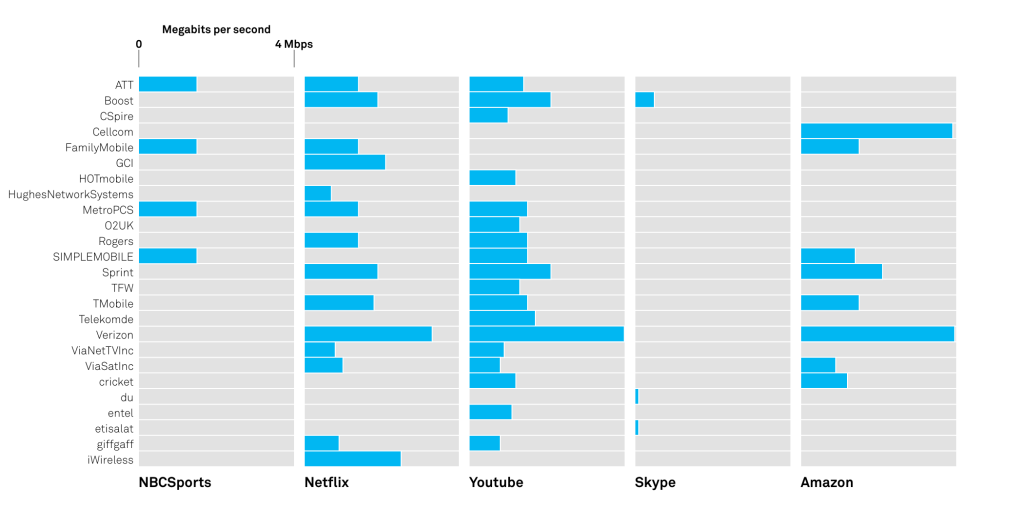
Since 2017 most ISPs across the USA have been named and shamed for throttling users’ connections. Below is a brief insight into the service providers that mostly throttle the internet:
CenturyLink
CenturyLink ranks as a top ISP provider in the USA. The company, since 1968, has been providing various broadband subscription plans to users and promises fast connection speeds. However, CenturyLink throttles the internet connection during peak hours, i.e., from 7 pm onwards. It is when most users are browsing the web, either streaming or playing online games or downloading torrents which results in more significant network congestion.
Spectrum
Charter Communications acquired Time Warner Cables in 2016 and was named Spectrum Internet Service. It was the second largest service provider across the US, with over 30 million subscribers. Though the company promises to provide the fastest internet speed for all activities, the speed users get extremely slow and ruin their experience.
Spectrum throttles the connection of all users involved in high-bandwidth consumption activities such as torrenting and streaming. Even users on Reddit complained about it. However, the ISP cannot impose data caps because of the conditions applied to its 2016 purchase. Under these conditions, the FCC prohibits Charter Communications from imposing data caps.
Currently, Spectrum doesn’t enforce data caps, but it’s more likely to change its terms of service in the future. The agreement clause will end in June 2023, so the company might again start imposing data caps.
Comcast Xfinity
Despite promising fast speeds, Comcast is among the top internet service providers that throttle the connection on various occasions. In 2007, Comcast violated the net neutrality rules and throttled users’ connection to the popular BitTorrent file-sharing software. But, in 2009, Comcast faced a $160 million fine for throttling the users’ traffic on BitTorrent. Soon after this incident, the service provider announced they would use a congestion management system to stop people from engaging in high bandwidth activities.
In addition, Comcast introduced paid prioritization charges under which they throttle users’ bandwidth on Netflix. But what was more concerning was that the company decided to impose access charges of $10 or more each month if Netflix disagreed with its terms. Besides this, Comcast announced the network optimization practice that will affect the 3G and 4G LTE users by throttling their connections.
Verizon
Verizon is famous for providing 4G internet coverage to 70% of US citizens but still throttles their connection. The telecom provider has a long history of throttling users’ connections and stopping them from doing what they want. In 2012, it was the first occasion when the FCC caught the ISP for blocking users from using tethering apps.
Later after five years, in 2017, Verizon accepted that they throttle the data on YouTube as part of their video optimization program. After this incident, though the company promised not to be involved in any unfair practice, users still complained about slow speeds while streaming. Additionally, a report finds that Verizon throttles 66% of users while streaming on Netflix, 49% on YouTube, and 38% on Amazon Prime.
Apart from this, in 2018, the most shameful incident was the Santa Clara Fire Department incident. Verizon throttled the connection of the fire department by enforcing data caps when it exceeds over 25GB of bandwidth while combating a wildfire. It was a highly unethical act, and the fire department filed a complaint against Verizon.
AT&T
Despite being a top internet service provider, AT&T follows a shady practice of throttling users’ internet connection without consent. The telecom provider on its website justified its act of limiting internet speed. Besides this, in 2014, they breached the net neutrality laws and throttled users’ bandwidth. However, in response, the FCC filed a penalty against them.
Later, in July 2021, AT&T announced not to throttle data on an unlimited plan. Also, they introduced a Sponsored Data Program that rewards the users for using the third-party service without throttling the bandwidth. In other words, it won’t benefit the non-sponsored companies, which was another occasion when AT&T violated net neutrality.
Cox communications
Cox Communications is the third largest broadband provider in the USA. In June 2020, users complained that Cox was reducing internet speed throughout the USA. Like other ISPs, Comcast also throttles the connection. The company took this initiative to keep a balance between the average and heavy bandwidth users. In this regard, the ISP also sends warning letters to the users who use a lot of bandwidth and warns them to control their data usage.
How to stop mobile data throttling
Mobile networks often impose limitations, making it more probable to encounter internet throttling on your mobile data plan than on your home broadband connection. The inherent constraints of mobile networks contribute to this discrepancy, highlighting the increased likelihood of experiencing reduced internet speeds and restricted data usage on mobile devices.
Mobile networks face various limitations that impact their performance:
- Latency: Mobile networks often experience fluctuations in latency, leading to lags in online games and video calls, unlike more stable broadband connections.
- Soft Caps: Mobile network providers impose ‘soft caps’ targeting high-bandwidth activities. For instance, your contract might allow unlimited streaming speeds for the initial 10GB of data but then throttle your speed to 10Mbps for the remaining data usage.
- Infrastructure: Cell towers have limited bandwidth and slower speeds than broadband connections. However, the advent of 5G mobile networks shows promise in bridging the gap and improving connection speeds.
Unlike wired broadband packages, wireless mobile deals frequently impose data caps, restricting data usage. Even so-called ‘unlimited’ mobile data plans often have hidden data caps that can lead to speed throttling if you surpass them.
While a VPN cannot eliminate data caps on mobile devices and potentially increase data consumption, it can bypass ‘soft caps’ on your data plan, such as streaming speed limitations after reaching a specific data limit.
By encrypting your device’s traffic and concealing it from your mobile network provider, a VPN prevents them from slowing down or restricting your traffic based on your online activities. Installing a VPN is, therefore, the most efficient method to counter mobile data throttling.
How do VPNs help bypass ISP throttling?
ISP throttling is not something that a user can’t control or stop. However, there are various ways by which bypassing ISP throttling becomes easy, and connecting to a VPN is the best and easiest method to overcome this issue.
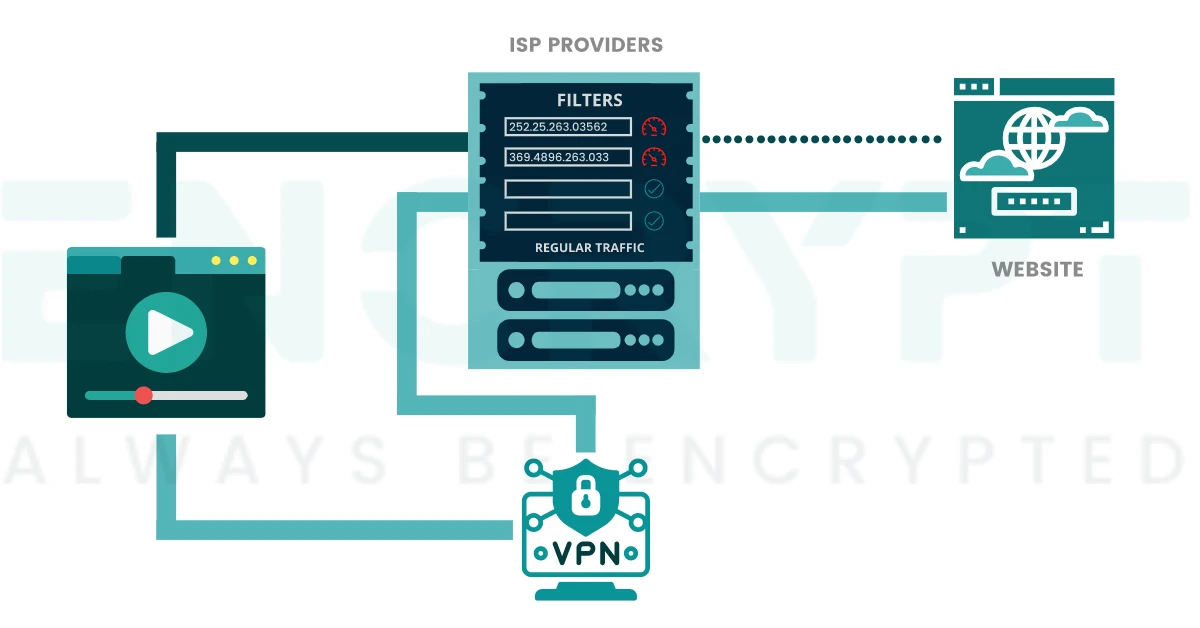
A reliable VPN provider encrypts the data traffic using strong encryption. It sends the internet traffic via an encrypted tunnel, meaning your ISP can’t view the websites you’re trying to access. Also, connecting you to a remote VPN server masks your IP address and assigns the IP address of the VPN, making you more anonymous and providing secure access to the internet. Hence, you can easily bypass the ISP filters and the system that detects high bandwidth activities.
Besides this, certain features in a VPN provider also help bypass ISP throttling. Hence, when you choose a VPN so, don’t overlook the following features:
- Server Network: A VPN with a vast server network means it has servers across every country. This results in less ping time and establishes a quick connection.
- Fast Speed: The best VPN for throttling offers super-fast speed without significant connection drops across all servers.
- Privacy Aspect: Ensure the VPN follows a strict no-log policy and neither logs nor shares users’ activities with anyone.
- Extra Features: A VPN offering additional features like a kill switch, private DNS, IP leak protection, and obfuscated technology further makes you anonymous over the web.
It is a common myth that VPNs might slow internet speed and must not be used. However, this is not completely true. While connecting to a remote server and establishing a connection takes time, the best VPN for throttling ensures that the slowed-down time doesn’t impact your online activity. Therefore, using a VPN the fastest VPN for speed is crucial.
Best VPNs to stop ISP throttling
With a reliable VPN provider, it’s easy to prevent ISPs from detecting internet traffic and surf the web with the fastest connection speed. Here’s an insight into the six best VPNs that help users bypass ISP throttling:
1. NordVPN
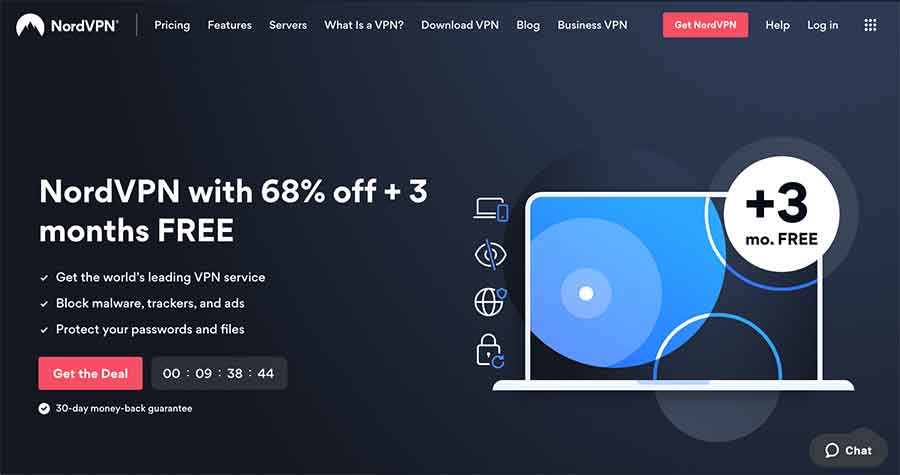
The Panama-based NordVPN is an excellent option to use for bypassing ISP throttling. It offers top-notch security and uses obfuscated technology that disguises the VPN traffic as regular internet traffic and escapes quickly from the eyes of the service providers. Besides this, the VPN provider has unique features that hide the IP address and guarantee maximum protection from the ISPs like:
- Kill switch
- DNS and IP leak protection
- Double VPN
Another thing that makes NordVPN stand out as the best VPN to bypass bandwidth throttling is its extensive server network. It offers over 7,600 servers in 118+ countries, ensuring a fast connection with less ping time. In addition, the VPN uses the NordLynx protocol, enhancing speed while browsing, streaming, and downloading.
The service provider follows a strict no-log policy and frowns upon collecting and sharing users’ information. Also, it has undergone a log audit process to prove that it’s honest with its claims and that people can trust it for its digital privacy. For all these reasons, NordVPN is the perfect choice for preventing throttling.
2. ExpressVPN
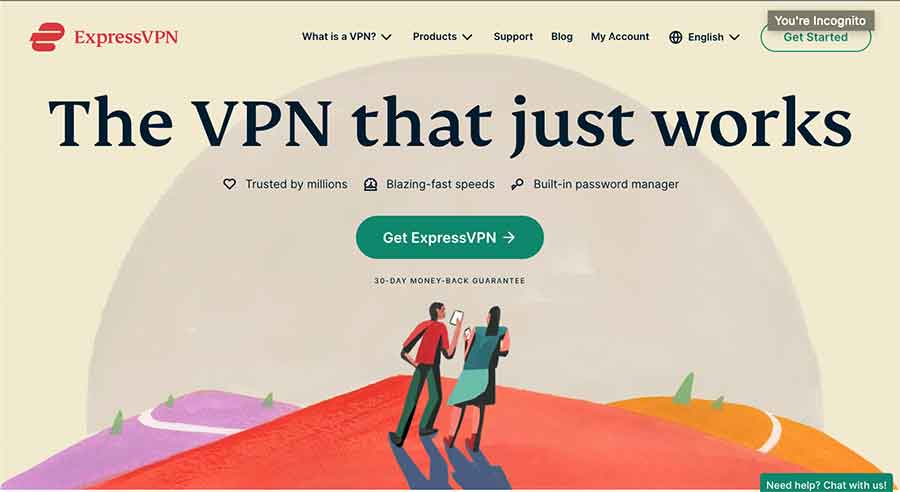
ExpressVPN is another best VPN to bypass internet speed throttling and enjoy super-fast speeds. It uses the proprietary Light Way protocol and offers an extensive server network in 105 countries, enabling users to get maximum speed while streaming, gaming, and downloading. One of the best things about ExpressVPN is when you choose a server; it allows users to perform a speed test to ensure that the server offers the desired speed for any activity.
The VPN provider uses strong encryption that hides and protects the internet traffic from the ISPs and ensures anonymity on the web. Additionally, it also has various other features that provide robust online security and privacy and help prevent ISP throttling, such as:
- IP leak protection
- Split tunneling
- Trusted Server Technology
- SmartPlay
- Private DNS servers
Moreover, ExpressVPN is a no-log VPN that guarantees not to log or share your data with anyone, including the ISPs, so you can trust this VPN as it promises to keep your activities private. As a whole, ExpressVPN completely hides the VPN traffic and stops ISPs from throttling your connections.
3. CyberGhost
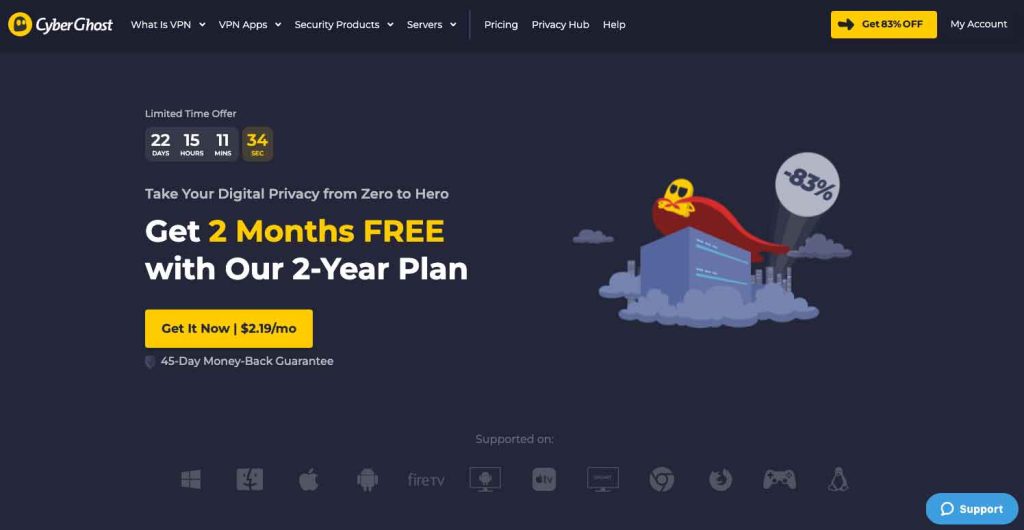
CyberGhost is among the best VPNs for bypassing throttling issues. The VPN offers blazing-fast speed and the highest level of security to protect online activities from ISPs. The best thing about CyberGhost VPN is that it provides dedicated servers for streaming, torrenting, and gaming. All these servers offer unlimited bandwidth and a vast server network of 6000+ servers in 88 countries that help ensure that the users don’t face connection lags.
The VPN provider offers NoSpy servers, which is a great feature that helps ensure reliable streaming. Besides this, CyberGhost offers impressive features that grant anonymity on the web and make it nearly impossible for the ISP to detect your network traffic. Some of these features include:
- Dedicated IP address
- Kill switch
- IP and DNS leak protection
Above all, CyberGhost is a secure VPN provider that uses the industry’s highest encryption and security protocols to prevent ISPs from monitoring online activity. In addition, it is a no-log VPN provider that ensures not to log your data or activities that can expose your identity. Therefore, try out CyberGhost VPN for maximum speed and security while surfing the web.
4. Surfshark
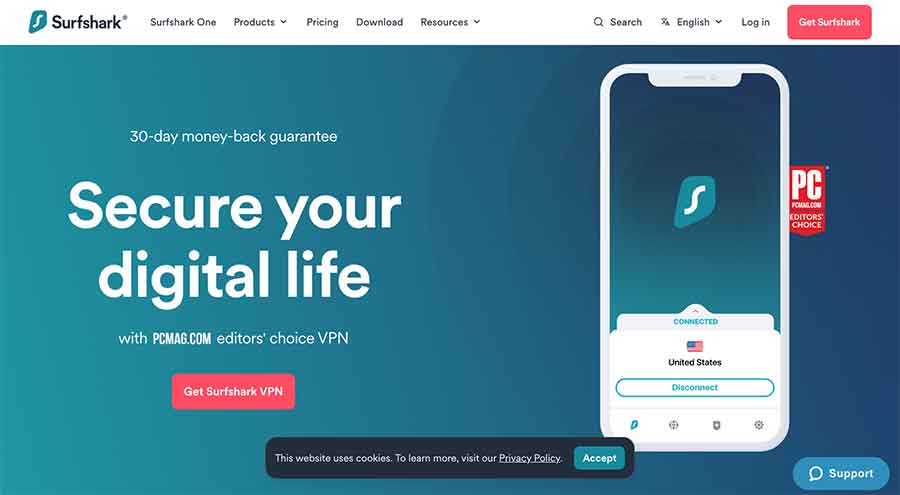
Surfshark VPN is another reliable VPN to use for bypassing bandwidth throttling. It is feature-packed with various impressive features for keeping your identity hidden from ISPs. Some of its distinctive features that prevent throttling are as follows:
- No Borders mode
- Camouflage mode
- Kill switch
- IP and DNS leak protection
- GPS spoofing
- Device invisibility
The service provider’s speed also makes it the most preferred choice of the users. It has a decent server network comprising 3200+ servers in over 100 countries; the best part is that it continuously adds more servers. Moreover, the VPN provides consistent and fast connection speed sufficient for high-bandwidth activities like streaming and downloading. Since Surfshark VPN uses WireGuard protocol, it’s another reason that you’ll get a stable internet connection.
Besides this, Surfshark’s security and privacy standards also make it difficult for the ISP to intercept users’ privacy. It deploys AES-256-bit encryption and follows a verified no-log policy that guarantees ultimate privacy on the web. Overall, Surfshark is a great VPN that is affordable, so do try it out once.
5. Proton VPN
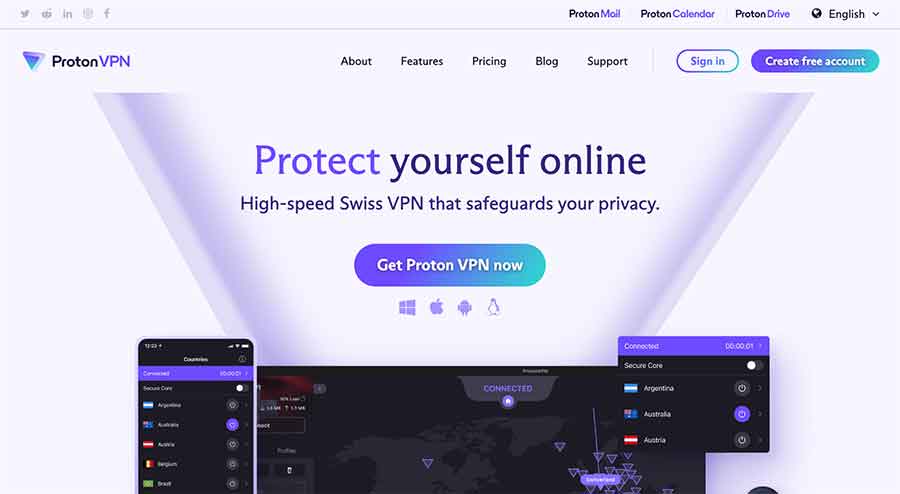
Proton VPN is among the best top-rated VPN providers that use strong encryption to hide the data traffic from the prying eyes of the ISPs. The VPN deploys virtually uncrackable AES-256-bit encryption and secures tunneling protocols like OpenVPN and WireGuard to safeguard the internet traffic from the ISPs. In addition, Proton VPN protects against IP leaks and ensures that the ISP cannot get to know about your online activities.
The VPN provider has recently introduced a stealth protocol that helps bypass the detection filters used by ISPs and browse the web freely. Besides this, it offers a few impressive security and privacy-centric features that keep them more private on the web, like:
- Kill switch
- Alternate routing technology
- Secure core servers
Proton VPN also follows a verified no-log policy that prevents recording or sharing data with prying eyes. Another impressive Proton VPN feature is the VPN accelerator. It is a speed-centric feature that increases the VPN speed to its fullest. Also, it has 12,000+ servers in over 122 countries. All the server offers unlimited bandwidth and quickly establishes the connection, leaving room for the ISP to identify the network traffic.
6. VyprVPN
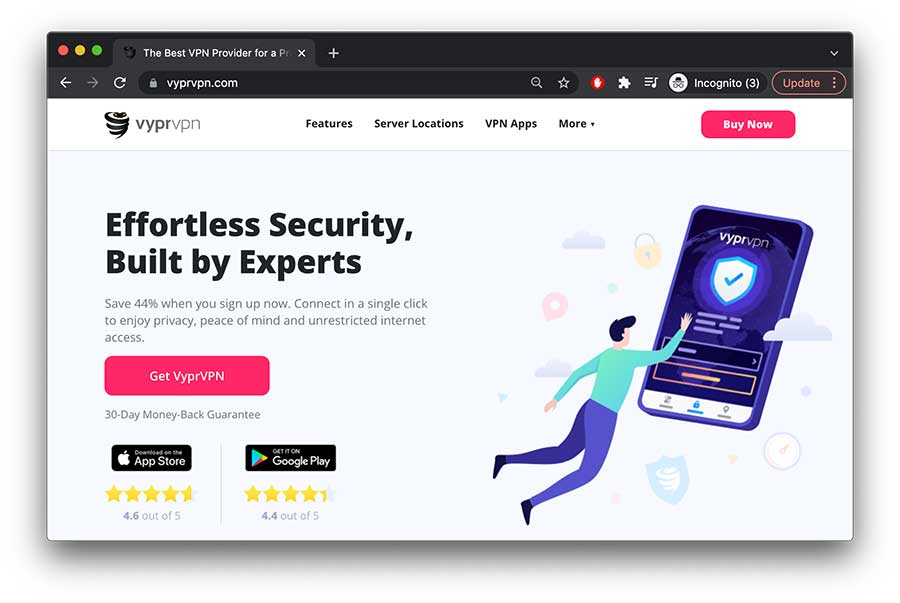
VyprVPN, due to its security standards and fast speed, emerges as the best VPN for bypassing ISP throttling. Though it offers a limited server network spread, speeds are stable enough for browsing, streaming, and downloading. It uses the proprietary Chameleon protocol that helps get around censorship or filters to detect your activities and improves speed. This way, VyprVPN ensures a seamless downloading and streaming experience.
The service provider is a private VPN that follows a verified no-log policy and guarantees not to share your data with anyone. However, unlike most other VPN providers, VyprVPN lacks advanced features, but it does include all essential features that are needed to hide your identity from the ISPs, such as:
- Kill switch
- Connection per app
- VyprDNS
- Public Wi-Fi protection
Besides this, VyprVPN also uses a NAT firewall feature that doesn’t show your IP address and prevents the network from identifying you. Also, it uses military-grade solid encryption to hide the data from the ISPs and ensures an interrupted user experience.
Can a free VPN stop internet throttling?
Besides enhancing your data security, a VPN can prevent ISP throttling, which helps to improve your internet speeds. So, you can bid farewell to the frustrating buffering wheel and eliminate those agonizing seconds spent waiting for web pages to load.
When considering using a free VPN provider to bypass ISP speed throttling, it’s crucial to understand that the effectiveness of your connections depends on your choice of VPN. However, most free providers impose monthly data limits, which might not be sufficient for your browsing needs.
Moreover, free VPNs usually offer limited server network access, which is usually congested leading to slow speeds. Also, they lack essential features to safeguard your data and ensure complete privacy from ISPs and other third parties. So, you should be wary of free VPNs and avoid them at all costs.
Is it possible to bypass ISP throttling without a VPN?
Dealing with ISP throttling can be a frustrating experience. Thankfully, there are effective measures you can take to counteract it and regain control over your internet connection without relying solely on a VPN.
Using a proxy
A proxy effectively substitutes your IP address with the proxy’s server by serving as an intermediary between your device and the internet. This allows you to mask your location and potentially experience improved speed without detection by your ISP.
Nevertheless, it’s important to note that proxies lack data encryption, meaning they don’t safeguard your data.
Upgrading your data plan
If you find your current contract with your ISP or mobile provider overly restrictive, upgrading to a more flexible data plan might be worth considering. The risk of bandwidth throttling arises when you exceed your allocated data limit, and subscribing to a lower-tier plan can deprioritize your data compared to other users.
Opting for an unlimited data plan allows you to easily circumvent data caps, enjoy access to fast lanes, and stream high-resolution videos. However, it’s important to note that upgrading your data plan often comes with a higher subscription fee than you’re currently paying, making it a potentially costly decision.
Switching to a new ISP
If you have exhausted all the previously mentioned methods and cannot prevent your ISP from throttling your internet, switching to a different ISP is the ultimate solution. You can enjoy unrestricted connection speeds and internet access without limitations by transitioning to a new provider that implements superior network management policies.
However, it’s important to note that changing ISPs can be costly and disruptive, involving potential exit fees and additional hardware installation. Furthermore, there is no guarantee that your new ISP won’t use internet throttling, especially during network congestion.
FAQs
Share this article
About the Author
Rebecca James is an IT consultant with forward thinking approach toward developing IT infrastructures of SMEs. She writes to engage with individuals and raise awareness of digital security, privacy, and better IT infrastructure.
More from Rebecca JamesRelated Posts

10 Best Alternatives of Tunnelbear (Free and Paid in 2025)
KEY TAKEAWAYS If you have decided not to use TunnelBear VPN, then the following VPN providers will i...

How to Hide Your IP Address? 7 Best Ways
KEY TAKEAWAYS Masking your IP address is necessary to protect yourself from multiple cyber threats. ...
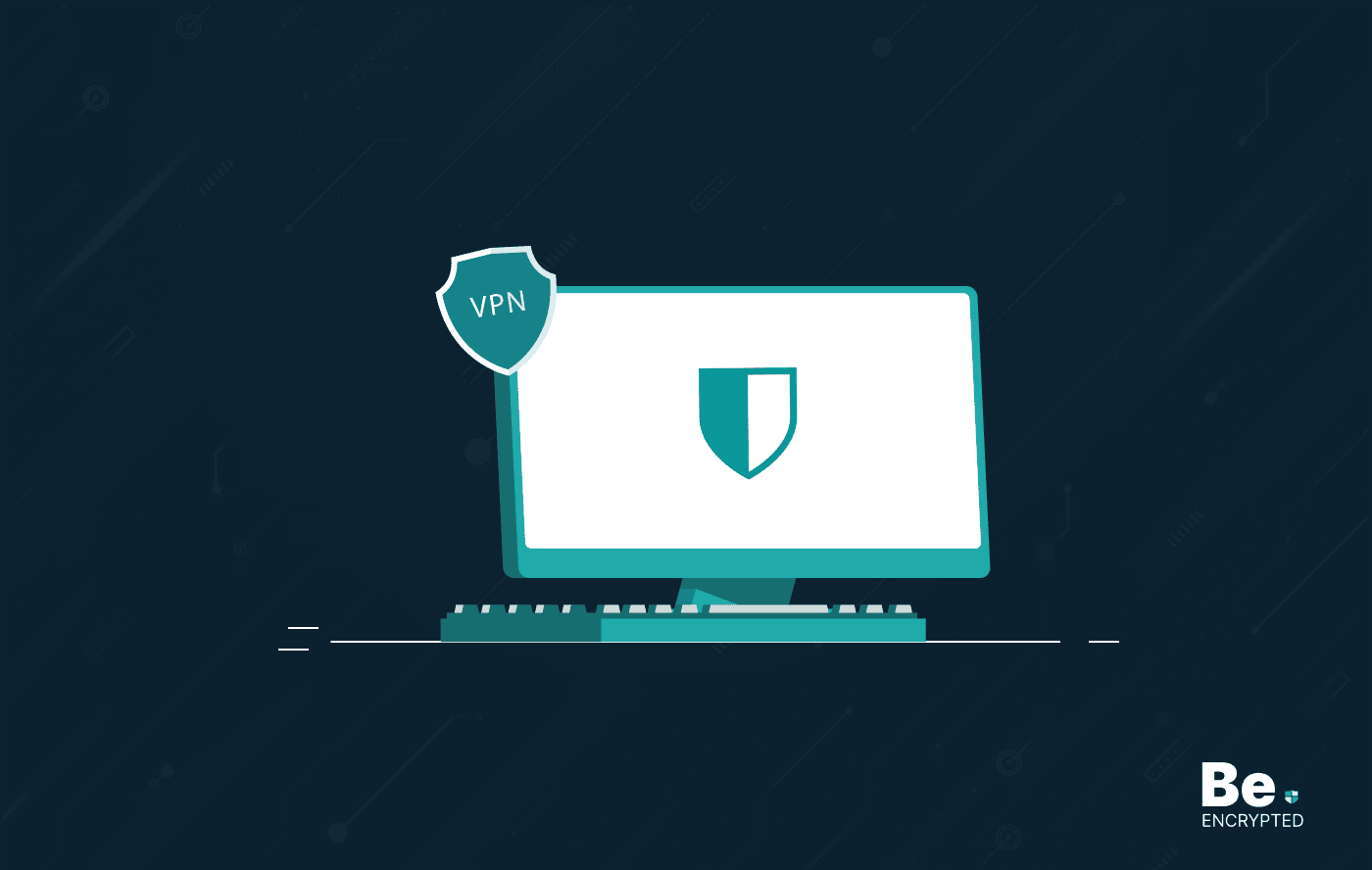
What is a VPN Kill Switch and How Does it Work?
Numerous internet users have now observed the possible risk of online data exposure to ISPs or cyber...

Does VPN Slow Down Internet Speed? [Resolved]
KEY TAKEAWAYS A VPN connection indeed reduces your speed because of encryption protocols. It routes ...

Why Should You Use a VPN? 12 Best Reasons
KEY TAKEAWAYS As almost everyone has nowadays access to the internet, more cyberattacks are taking p...

Can You Be Tracked If Using a VPN in 2024
KEY TAKEAWAYS You can be tracked using a VPN if your VPN leaks your IP address, which may result in ...


